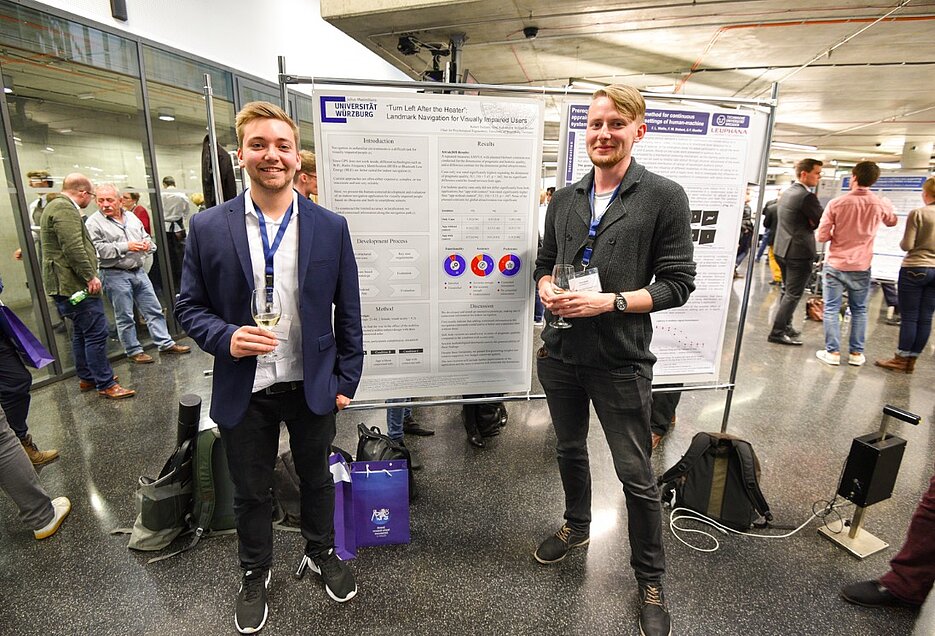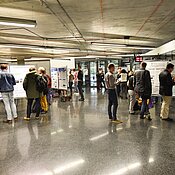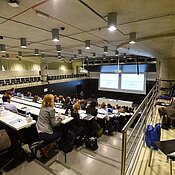HFES Europe Chapter
02.11.2016Auf dem diesjährigen Treffen der Human Factors and Ergonomics Society European Chapter in Prag war der Lehrstuhl für Psychologische Ergonomie mit zwei Posterbeiträgen beteiligt.
“Turn Left After The Heater”: Landmark Navigation For Visually Impaired Users
Robert Tscharn, Tom Außenhofer, Dimitri Reißler
Abstract
Indoor-navigation is a challenging task for visually impaired people. First exploratory studies showed that the iBeacon standard as a low-cost localization technology has high potential for improving autonomy of visually impaired people (Ruffa, 2015). However, the limited accuracy of this approach can lead to fatal errors and frustration amongst users. The here presented work aims at supplementing navigation commands by contextual information such as sudden changes in the surface structure or heaters. Based on requirements gathered during a user-centred design process with five visually impaired participants, an accessible application with iBeacon-based localization was developed allowing for navigation with or without contextual information (e.g., “turn left in 10 meters after the surface changes from stone to carpet” vs. “turn left in 10 meters”). In a first evaluation, eleven visually impaired participants rated their user experience (e.g. pragmatic quality, hedonic quality) of these two versions and a baseline (only prior instruction) during an indoor-navigation task. Results confirmed the hypothesis that the negative effect of an inaccurate localization on the user experience can at least partially be reverted by context information and that multimodal perceivable reference points along the path provide valuable and usable information during indoor-navigation for visually impaired people.
Opportunities for Standing Up: Combating the Sedentary Workplace through Contextual Design
Diana Löffler, Birgit Wallmann-Sperlich, Juri Wan, Jennifer Knött, Anna Vogel, Tobias Grundgeiger
Abstract
Many occupations require workers to perform most of their daily tasks sitting down, spending up to two thirds of their workday engaged in sedentary work (Huysmans et al., 2015). Prolonged sitting during work, transport and leisure time has been shown to increase the risk for premature death (Dunstan et al., 2010). Complementing the mostly quantitative research done in the field, we followed a contextual design process to identify environmental, motivational and social factors that contribute to and interrupt sedentary behaviour. Data from full-day work observations of 10 desk-based office workers in individual, shared and open-plan offices revealed detailed qualitative data about the workers’ tacit knowledge about their own habits and believes, as well as their surrounding physical workplace layout that promotes prolonged sitting. Based on this, we developed simple and low-cost design ideas and suggestions that can be easily implemented in the workplace environment and create more opportunities for standing up. For example, distributing frequently used objects and reducing the attractiveness of sitting are simple means to interrupt and decrease long periods of sedentary work. Selected design ideas were further tested in a subsequent field study.
Über das HFES Europe Chapter
The Human Factors and Ergonomics Society, Europe Chapter, is organised to serve the needs of the human factors profession in Europe. Its purpose is to promote and advance through the interchange of knowledge and methodology in the behavioural, biological, and physical sciences, the understanding of the human factors involved in, and the application of that understanding to the design, acquisition, and use of hardware, software, and personnel aspects of tools, devices, machines, equipment, computers, vehicles, systems, and artificial environments of all kinds. The Chapter is an affiliate of the Human Factors and Ergonomics Society, Inc., a nonprofit corporation chartered by the State of California, USA, to operate exclusively for charitable, educational, scientific, and literary purposes by authority of, and in accordance with, the Articles of Incorporation, the By-Laws, and the operating rules of the Society now in force or hereafter amended.





